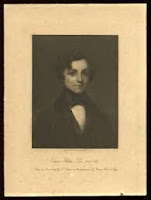 |
| Portrait of young Edgar Allen Poe |
The poem, “Spirits of the
Dead” was written by Poe in 1827 when he was just 18 years old. This fact is
impressive, considering this verse reflects both a subject matter and writing
ability beyond Poe’s tender age.
He takes on one of life’s
great mysteries in this poem. What happens when we die? He refers to the
deceased in this poem only as “ thy soul” or “spirits.”
Spirits of the Dead
Thy soul shall find itself alone
‘Mid dark thoughts of the grey tombstone—
Not one, of all the crowd, to pry
Into thine hour of secrecy.
Be silent in that solitude,
Whish is not loneliness—for then
The spirits of the dead who stood
In life before thee are again
In death around thee—and their will
Shall overshadow thee: be still.
The night, tho’ clear, shall frown—
And the stars shall look not down
From their high thrones in the heaven,
With light like Hope to mortals given—
But their red orbs, without beam,
To thy weariness shall seem
As a burning and a fever
Which would cling to thee for ever.
Now our thoughts thou shalt not banish,
Now are visions ne’ er to vanish;
From thy spirit shall they pass
No more—like dew-drop from the grass.
The breeze—breath of God—is still—
And the mist
upon the hill,
Shadowy—shadowy—yet unbroken,
Is a symbol and a token—
How it hangs upon the trees,
A mystery of mysteries!
Source: The Complete Poems and Stories of Edgar Allan Poe (1946)
 |
| Click to enlarge |
There are as many
interpretations of this poem as there are people who have read it so I will
only share my thoughts.
I love Poe’s use of imaginary
in this verse it made me pause and think.
Is he contemplating his own fear
of death or is he referring to the loss of a loved one?—“Mid dark thoughts of
tombstone.”
Regardless, he is obviously musing
about what happens after death.
He questions:
Are we in limbo before our
final journey?—“ The soul shall find itself alone.” “Not one, of all the crowd,
to pry.”
Is our passage to the
afterlife one of solitude?-- “find itself alone”
Or do we encounter loved ones
to guide us? —“In life before thee, are again in death around thee.”
Do we retain our memories, or
are they lost? --“No more, like dew-drop from the grass.”
He also questions why God
leaves us in the dark?—“The breath of God is still.” I wonder if Poe’s contemporaries
pointed him to the Bible to find the answer to this.
But Poe does not try to
answer any of the questions he ponders. Instead, he just presents them for
consideration. He acknowledges that death is life’s great secret.—“A mystery of
mysteries!”
Here are links to other posts
about Poe.



2 comments:
What an interesting poem by a very young Poe. There's so much to ponder, as you said, Virginia. Poe seems much wiser than most 18-year olds. Thanks for sharing this timeless poem about the mystery of death. Also, I've never seen a photo of Poe as a teenager. He was really handsome. May his Spirit find a peace and happiness on the Other Side.
He didn't have much peace in life--so I as well hope he has received some peace in death.
Post a Comment